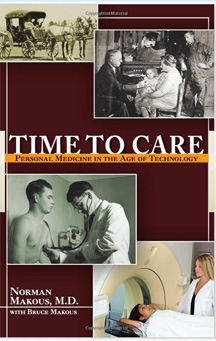February 25th, 2010 by Harriet Hall, M.D. in Better Health Network, Opinion, Research
1 Comment »

Everybody knows that colonoscopy is the best test to screen for colorectal cancer and that colonoscopies save lives. Everybody may be wrong. Colonoscopy is increasingly viewed as the gold standard for colorectal cancer screening, but its reputation is not based on solid evidence. In reality, it is not yet known for certain whether colonoscopy can help reduce the number of deaths from colorectal cancer. Screening with fecal occult blood testing (FOBT) and flexible sigmoidoscopy are supported by better evidence, but questions remain. It seems our zeal for screening tests has outstripped the evidence.
Statistics show that the life-time risk for an adult American to develop colorectal cancer (CRC) is approximately 6%. Colorectal cancer is the second leading cause of cancer deaths in the United States. In the US there are currently 146,970 new cases and 50,630 deaths each year. Between 1973 and 1995, mortality from CRC declined by 20.5%, and incidence declined by 7.4% in the United States. Read more »
*This blog post was originally published at Science-Based Medicine*
February 18th, 2010 by Harriet Hall, M.D. in Better Health Network, Book Reviews
No Comments »

 In 1925, Francis Peabody famously said “The secret of the care of the patient is in caring for the patient.” A new book by Norman Makous, MD, a cardiologist who has practiced for 60 years, is a cogent reminder of that principle.
In 1925, Francis Peabody famously said “The secret of the care of the patient is in caring for the patient.” A new book by Norman Makous, MD, a cardiologist who has practiced for 60 years, is a cogent reminder of that principle.
In Time to Care: Personal Medicine in the Age of Technology, Dr. Makous tackles a big subject. He attempts to show how modern medicine got to where it is today, what’s wrong with it, and how to fix it. For me, the best part of the book is the abundance of anecdotes showing how medicine has changed since Dr. Makous graduated from medical school in 1947. He gives many examples of what it was like to treat patients before technology and effective medications were introduced. He describes a patient who died of ventricular fibrillation before defibrillators were invented, the first patient ever to survive endocarditis at his hospital (a survival made possible by penicillin), a polio epidemic before polio had been identified as an infectious disease, the rows of beds in the tuberculosis sanitariums that no longer exist because we have effective treatments for TB. Read more »
*This blog post was originally published at Science-Based Medicine*
January 14th, 2010 by Harriet Hall, M.D. in Better Health Network, Opinion, Research
1 Comment »

A recent story on NPR accused the drug manufacturer Merck of inventing a disease, osteopenia, in order to sell its drug Fosamax. It showed how the definition of what constitutes a disease evolves, and the role that drug companies can play in that evolution.
Osteoporosis is a reduction in bone mineral density that leads to fractures. The most serious are hip fractures, which require surgery, have complications like blood clots, and carry a high mortality. Many of those who survive never walk again. Vertebral fractures are common in the osteoporotic elderly and are responsible for dowager’s hump and loss of height. There is also an increased risk of wrist and rib fractures. Read more »
*This blog post was originally published at Science-Based Medicine*
December 24th, 2009 by Harriet Hall, M.D. in Better Health Network, Opinion, Quackery Exposed
1 Comment »

Chiropractors, homeopaths, naturopaths, acupuncturists, and other alternative medicine practitioners constantly criticize mainstream medicine for “only treating the symptoms,” while alternative medicine allegedly treats “the underlying causes” of disease.
Nope. Not true. Exactly backwards. Think about it. When you go to a doctor with a fever, does he just treat the symptom? No, he tries to figure out what’s causing the fever and if it’s pneumonia, he identifies which microbe is responsible and gives you the right drugs to treat that particular infection. If you have abdominal pain, does the doctor just give you narcotics to treat the symptom of pain? No, he tries to figure out what’s causing the pain and if he determines you have acute appendicitis he operates to remove your appendix. Read more »
*This blog post was originally published at Science-Based Medicine*
December 17th, 2009 by Harriet Hall, M.D. in Better Health Network, News, Quackery Exposed, Research
1 Comment »

An article written by 4 chiropractors and published on December 2, 2009 in the journal Chiropractic and Osteopathy may have sounded the death knell for chiropractic.
The chiropractic subluxation is the essential basis of chiropractic theory. A true subluxation is a partial dislocation: chiropractors originally believed bones were actually out of place. When x-rays proved this was not true, they were forced to re-define the chiropractic subluxation as “a complex of functional and/or structural and/or pathological articular changes that compromise neural integrity and may influence organ system function and general health.” Yet most chiropractors are still telling patients their spine is out of alignment and they are going to fix it. Early chiropractors believed that 100% of disease was caused by subluxation. Today most chiropractors still claim that subluxations cause interference with the nervous system, leading to suboptimal health and causing disease. Read more »
*This blog post was originally published at Science-Based Medicine*












